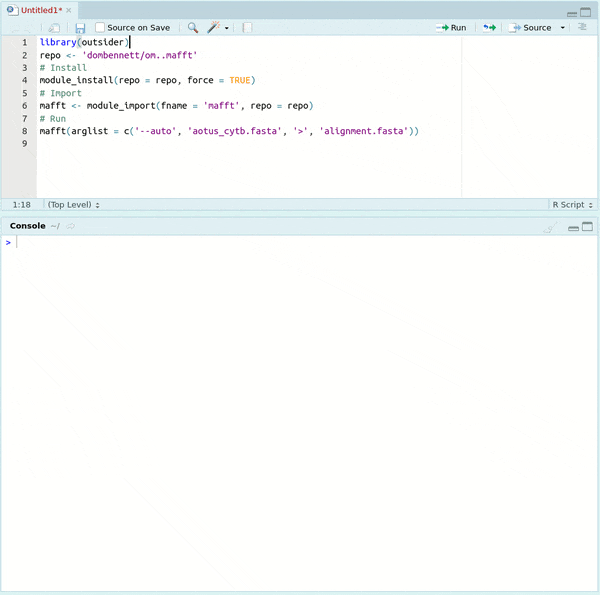The Outsider is always unhappy, but he is an agent that ensures the happiness for millions of ‘Insiders’.
The Outsider, Wilson, 1956.
Integrating external programs into a deployable, R workflow can be
challenging. Although there are many useful functions and packages (e.g.
base::system()) for calling code and software from alternative
languages, these approaches require users to independently install
dependant software and may not work across platforms. outsider aims to
make this easier by allowing users to install, run and control programs
outside of R across all operating systems.
It’s like whalebrew but exclusively for R.
For more detailed information, check out the outsider
website
To install the development version of the package …
remotes::install_github('ropensci/outsider')Additionally, you will also need to install Docker desktop. To install Docker visit the Docker website and follow the instructions for your operating system: Install Docker.
Tested and functioning on Linux, Mac OS and Windows. (For some older versions of Windows, the legacy Docker Toolbox may be required instead of Docker Desktop.)
library(outsider)
#> ----------------
#> outsider v 0.1.0
#> ----------------
#> - Security notice: be sure of which modules you install
# outsider modules are hosted on GitHub and other code-sharing sites
# this repo is a demonstration outsider module
# it contains a function for printing 'Hello World!' in Ubuntu 18.04
repo <- 'dombennett/om..hello.world'
module_install(repo = repo, force = TRUE)
# look up the help files for the module
module_help(repo = repo)
# import the 'hello_world' function
hello_world <- module_import(fname = 'hello_world', repo = repo)
# run the imported function
hello_world()
#> Hello world!
#> ------------
#> DISTRIB_ID=Ubuntu
#> DISTRIB_RELEASE=18.04
#> DISTRIB_CODENAME=bionic
#> DISTRIB_DESCRIPTION="Ubuntu 18.04.1 LTS"Modules available on GitHub since 15:15 16 January 2020 (CET)
● pathd8
● blast
● wikit
● pasta
● BAMM
…. Plus, at least, 10 more!
For more details, see the available modules table
Installing and running a multiple sequence alignment program (mafft).
(See “Evolutionary tree pipeline” for running this program yourself.)
Try raising an issue to request someone make a module, Raise an Issue.
Otherwise, why not make it yourself? Check out the
outsider.devtools
package.
There is a risk that outsider modules may be malicious. Modules make
use of the program Docker which allows any program to be efficiently
deployed by wrapping the program’s code, along with everything that
program requires to run e.g. operating system, dependent libraries, into
an executable container.
While this is useful for providing users with whichever programs they require, there is a potential security risk if, along with the desired program and dependencies, malicious software is also shipped.
A well-known malicious example of Docker container exploitation is in cryptocurrency mining. A container may ship with a cryptocurrency mining software that would make use of your computer’s resources while you ran you the module.
To minimise any security risks Be sure of which modules you install on
your machine. Whenever installing a new module, outsider will alert
you to the potential security risks. Before installing a new module, ask
yourself:
- Is this module from a well-known developer?
- How many others are using this module?
Consider checking the stats on the module’s GitHub page (e.g. number of stars/watchers) or looking-up the details of the developer (e.g. email forums, twitter, academic profile).
Additionally, you may wish to check the Dockerfile of the module. Does
it install programs from well-known code repositories (e.g. apt-get)?
Or is it running lines of code from unknown/untrackable URL sources?
outsider makes use of the program docker
which allows users to create small, deployable machines, called Docker
images. The advantage of these images is that they can be run on any
machine that has Docker installed, regardless of operating system. The
outsider package makes external programs available in R by
facilitating the interaction between Docker and the R console through
outsider modules. These modules consist of two parts: a Dockerfile
that describes the Docker image that contains the external program and
an R package for interacting with the Docker image. Upon installing and
running a module through outsider, a Docker image is launched and the
R code of the module is used to interact with the external program.
Anyone can create a module. They are hosted on
GitHub as well as other code-sharing sites and
can be searched for and downloaded through
outsider.
| Repo | Travis CI | Appveyor |
|---|---|---|
outsider.base |
||
outsider |
||
outsider.devtools |
||
| “Test suites” |
Released version 0.1.
Bennett et al., (2020). outsider: Install and run programs, outside of R, inside of R. Journal of Open Source Software, 5(45), 2038, https://doi.org/10.21105/joss.02038



